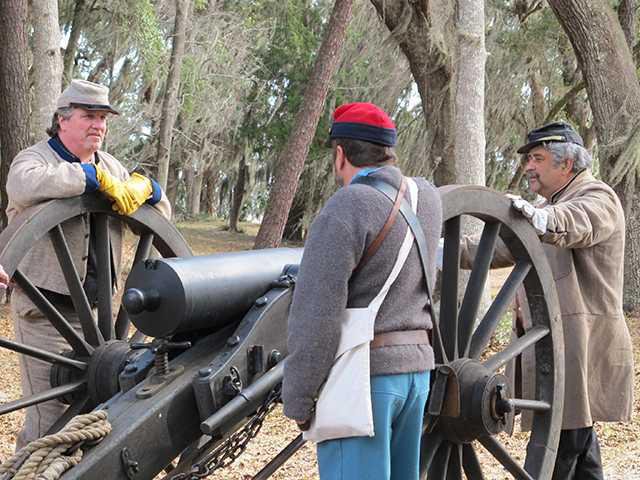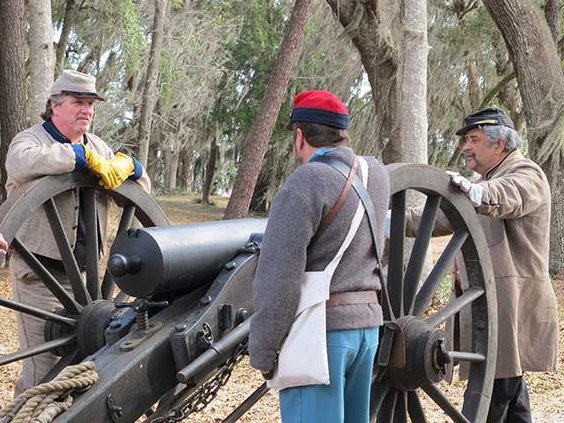Sunday, April 26, was Confederate Memorial Day. It was very appropriate that the Midway Church Homecoming was on that Sunday, and the weather could not have been better.
Ironically, a few days before, Joyce Moore, who lives in the Gum Branch area, lent me a notebook that had been made for her with information about her great-grandfather Martin Corbitt and two of his brothers who were in the Civil War. The notebook was filled with family history, maps where many battles took place and 12 personal letters that have survived the years that the brothers sent home to their parents.
Newsom Corbitt, from Clinch County, married Mary “Polly” Smith in 1831 and had six boys and five girls.
The Civil War broke out on April 12, 1861. In March 1862, three of the Corbitt boys volunteered. William “WB” Brinkley, born in 1835; Martin, born in 1839; and Manning, born in 1842, all joined a company formed of Clinch County men at Homerville on March 4, 1862. It was the Company G, 50th Regiment, Georgia Volunteer Infantry. Their uncle, Manning Smith, and his son, Moses, joined Company K, 26th Georgia Volunteers. In 1860, WB was farming 200 acres of land and raising hogs with Manning.
I am going to give some of the most interesting parts of letters written by these three young soldiers. I will try to spell the words the way they spelled them. There was only one from Manning that survived, written on May 23, 1862, from Savannah:
“Dear Father: I now seat myself to let you know I am tolerable well at this time. I have bin a little puny for a few days but I am now better. Martin is much on the mend. He has been tolerable sick for a few days but he is getting well and WB is fat as a bare. We have not drawed our bounty yet nor we do not no when we will. There is no news of interest here. We have plenty to eat. We have corn meal (flower), rise, serup, some bacon, beaf, coffee and rye and sugar to sweeten it. I have rote a letter for you to get every Saturday. Since I have been here, we have drawed our uniforms all but the cap and hit I don’t want. I am tolerable well satisfied here, but I am like all the rest, I would rather be at home sometimes and then again I am very well satisfied. I want you to spay them shoats on the Bay as soon as they get big enough. Some people will give a rite smart to see things in a show but I would see more to see little brother John than anything else so I will come to a close by saying fare well until I hear from you again. Manning Corbitt.”
Sgt. Charles Curry, the Corbitts’ cousin, reported to WB that he saw Manning with the Yankees in September. Manning had been captured. His grave was located 145 years later in Mount Olivet Cemetery in Frederick, Maryland, with a death date of Oct. 1, 1862. For all those years, the family did not know if he survived the war, assumed he did not, but did not know where he fell. Apparently, he survived the fighting in September 1862 but could not survive the illness, exhaustion, starvation and death in the prison camp in Maryland. Joyce Moore’s brother and his wife visited Manning’s grave.
Northeastern Virginia, Dec. 23, 1862 — “Dear People: Father, I have nothing good to rite but a heap of bad news. We just went threw a terrible fight but none of our group got killed but a bunch of our Boys did but nothing like the Yankees. There was 115 dead Yankees in a fifteen foot square. The battlefield was covered. I did not go on it for several days. Lt. Slater told me that some had their heads shot off and some their arms off. Some in one fix and some in another. When they buried them, they just threw them in pits that they dug with pick axes and shovels. Some with their arms and some with their legs out. Our men stripped the dead Yankees of all their clothes and took everything they had. You never saw the like of Bacon and hard bread that was scattered all over the ground. In town I picked up some Bacon myself enough to do me a week or two. This is as much as I can tote at once. I could write a heap more but hit is not worthwhile. Please see if Uncle William will make me a pair of shoes and send them to me and tell the girls to knit me a pair of two of socks. Rite how many fattening hogs you have up and what sort you have and how they are getting along and how are you getting along boiling sugar and how many barrels you have made. Sugar is worth a heap of money. You rote that you had salt which gave me satisfaction. If Martin is still at home tell him to get a doctor to write the Lt. Col. and tell him he is not able to come yet. I fear they will punish him when he comes. I want to see Martin mighty bad and the rest of the family. I want to see Little John. Tell him to feed my pigs until I come home and I will pay him. Nothing more and I remains yours as ever. William B. Corbitt”
Northeastern Virginia, Fredericks Burge, Feb. 26, 1863 — “Dear Sisters: I will inform you that I have one Virginia lady smartly attach to me. She thinks because I am an orderly sergeant of the company, I am something grate. But if she only know what I thought of hur, she would not have much to doo with me. I am so disgusted with Virginia until I would not have a wife here fer no price. So rite to me soon. So I remains yours as ever, Sergt. WB Corbitt.”
First week of April 1863 from Martin Corbitt to his family: “WB is not here to write himself, but I think that if he lives, he will git a furlou from the hospital and go home. He is in the Chimberazo Hospital in Richmond, VA. As for our eating fare, hit is bad enough. We only draw ¼ of a pound of meat per day. Hit is very sorry. We git plenty of flour but we are tired of hit. We can’t hardly eat that. We can buy a few peas sometimes for a dollar a quart. I got along with the close very well and they fitted very well.”
On Sept. 7, 1863, near Waters Cavern, in Northern Virginia, Martin wrote the last surviving letter home. He had been sick much of the winter and in the Winter Hospital. Martin Corbitt was the only one of the three brothers who made it home alive. They let him return before the war was over due to his ill health. He was able to look into the eyes of his parents and siblings and hold them in a tearful embrace. He was a fine man who named one of his sons after his brothers so that their names would not be forgotten.
Letters from brothers in Civil War
Liberty lore


Sign up for our e-newsletters